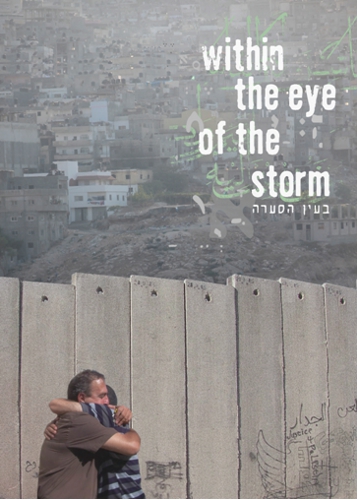Last weekend marked the crux of a five-year endeavor by film director Shelly Hermon and two men who have endured the greatest loss – that of a young daughter. In three cities across Israel, Hermon’s film “Within The Eye Of The Storm” screened in correlation with International Peace Day. The documentary film follows the stories of two men, one Israeli and one Palestinian, who chose to promote peace and cooperation in the face of their tragedies. Bassam Amin lost his ten year-old daughter when she was shot in the head with a rubber bullet by an Israeli soldier; Rami Elhanan lost his fourteen year-old daughter in a suicide bombing on Ben Yehuda Street in Jerusalem. These events occurred ten years apart, tearing apart families belonging to two societies separated by a wall of fear and hate – and yet, somehow the stories of these two men managed to meet and provide an outlet for healing and growth.

In an inspirational and heartbreaking story, the viewer is drawn in to see the values of cooperation and mutual understanding in an atmosphere that is far from conducive to it. Rami and Bassam, brought together by a mutual tragedy, have become something like brothers, and narrate parts of their stories together on the joint Israeli-Palestinian radio station All For Peace. Rami, who attended meetings of the Parents Circle-Families Forum, where Israelis and Palestinians grieve together the loss of their loved ones in the conflict, became a strong proponent of non-violent joint action after the death of his daughter. Bassam, a former participant in violent struggle, found humanity in Israelis after understanding the Holocaust and went on to co-found Combatants for Peace, a joint organization of Palestinian and Israeli ex-militants who want to work together for a peaceful solution.
I think it must be no coincidence that Hermon highlights these three important organizations throughout the film; the story told is plainly meant to convince the viewer that a higher road to peace is possible, and this higher road is made up of dialogue and humanization of the other side. What is especially remarkable about the film is that it does not over-glorify the value of dialogue, nor does it exclude the sacrifices that come with choosing peace over revenge. The viewer follows the struggles that each man faces within his family and within his society as a result of his choice to know the other. Some of the more powerful scenes included when Bassam brought Rami to meet a group of his Palestinian friends in Jenin, and they spoke candidly of their experiences in the conflict and the pain they had all endured at the hands of the other side; as well as a protest Rami attended in Tel Aviv calling for the return of Gilad Shalit, handing out stickers reading “Ze Lo Yigamer Ad She-Nedaber” (This Will Not End Until We Speak [to each other]) and making sure people agreed with the statement in order to wear it.
Without revealing the entire story of the film, many other scenes similarly exposed the bravery of going against the grain of hate and fear in Israeli and Palestinian society in a torn apart situation. Rami must watch his son enter the Israeli army, despite his own objections, and continues to love and respect him; Bassam juggles the task of attaining justice for his daughter’s death and devoting his entire life to the study and practice of peace and conflict resolution. Neither of these two men represent a norm in their respective societies; nonetheless, they can serve as role models and inspiration for those who have been personally hurt in the ongoing conflict. Hermon, her team and every character in the film took on an enormous personal task to expose themselves in the hope that this story will convince individuals to take the higher but harder path.
Hermon and Bassam both took the stage after the showing to say a few words and invite questions. The discussion that took place consisted mostly of a somewhat tearful audience who wanted to personally thank them for what they had done. It was powerful just to listen to Bassam speak about the film- to see him stand in West Jerusalem in front of a theater of Israelis and converse freely about why cooperation is crucial. Sitting just two rows in front of me was the best friend of Smadar, Rami’s daughter, who is seen in the film hurting so much over her loss. After an emotional 68 minutes getting to know these characters on screen, it was that much more powerful to share a room with them and know how real they are.
If this film can reach a wide audience, it is sure that it will be a useful tool to spread empathy and humanize the other. Hermon accomplishes this goal beautifully in her film, tugging at pure human emotions that can override prejudices. The film was screened at the Parliament in Oslo and included an online discussion afterwards in addition to the five screenings in Israel. It is available online to rent or buy with both Hebrew and English subtitles at the moment, and I sincerely hope that there will soon be screenings in Palestine and an option for Arabic subtitles as well.
www.withineyeofstorm.com
Trailer: http://www.youtube.com/watch?feature=player_embedded&v=k9xidxIkmUs
